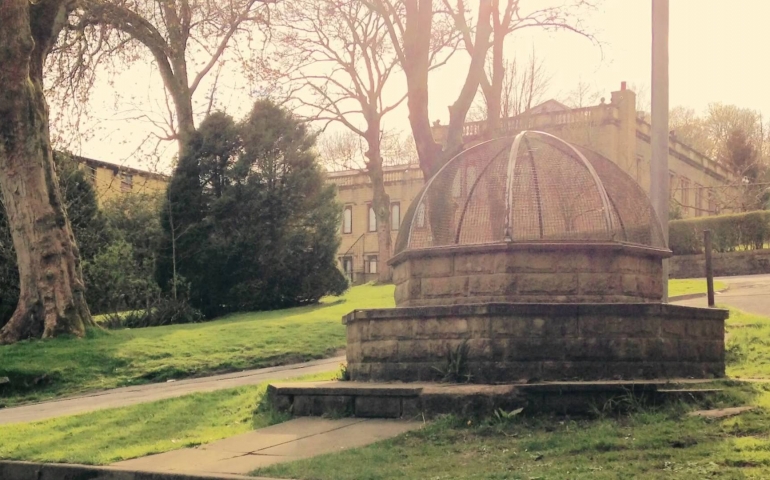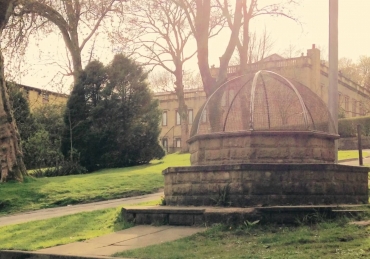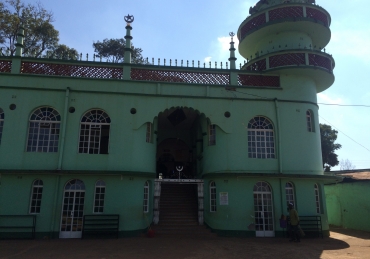Muftī Shabbir Ṣāḥib – A Scholar for the Ages
By Mawlana Ebrahim Noor, Coventry
I begin in the name of Allāh, the most Generous, most Merciful and sending Peace and Salutations on our beloved Messenger, Muḥammad ﷺ.
During each generation, Allāh chooses his special slaves to safeguard and protect the true message of Islām. Some of them will be bestowed with the ability to be walking, living examples of His religion. Others will be blessed with the ability of being a means of guidance for others. There will also be the Ḥuffāẓ Kirām who have been chosen to protect the word of Allāh and the ʿUlamā’ Kirām who will learn about Islām and spend their lives teaching others about the beautiful religion.
Among the ʿUlamā’, Allāh will further select a few special souls who rise amongst the Scholars and be shining beacons for not only the masses, but other Scholars as well. They will be blessed with special understanding of the Dīn as well as wisdom and forethought, enabling them to answer the difficult queries posed to them by both the public and students. Their 24-hour daily life is spent delving into the depths of knowledge yet being forever at the service of the Ummah whenever they are called for. One such person is my dear teacher, Muftī Shabbir Ṣāḥib Dāmat Barakātuhu.
I was recently asked by Muftī Shabbir Ṣāḥib’s younger son, Muftī Yusuf to write a few paragraphs about my interactions with Muftī Ṣāḥib, to be included with his biography which will be published soon. I felt very humbled and honoured at this request. There are many other Scholars who have spent more time with Muftī Ṣāḥib, in his company as well as being his students for a longer period, and they would be more fitting and deserving to write a few words. But I thought, by writing about him, I will first benefit myself and remember the many times where he has imparted special advice to myself and others in front of me. These anecdotes, I hope will allow others who are less acquainted with Muftī Ṣāḥib, understand and appreciate what type of Scholar he is and for those who are familiar with him, to recollect some of the many occasions where they will also have benefitted from him.
My first interaction with Muftī Ṣāḥib was when he attended a program in Coventry around the mid 2000’s, while I was studying the ʿĀlimiyyah course at the Islamic Academy of Coventry. I was fortunate enough to enrol for my final year at Darul Uloom Bury in 2013 where I studied under Mufti Ṣāḥib. During my time as a student and since leaving Darul Uloom, I have witnessed many qualities of my dear teacher. I will structure this short piece under a few headings which reflect some of the many positive traits he has been blessed with.
Love for imparting knowledge
Muftī Ṣāḥibs greatest passion is teaching and learning. The stories of Muftī Ṣāḥib’s classes in Darul Uloom Bury are legendary. Always on time, never late. I remember when I first sat in the Bukhārī Class. The speed at which he taught, the number of references given, I soon gave up writing notes in Urdu and reverted to English as I could not keep up. If any teacher was late in arriving for his next class, Muftī Ṣāḥib would be lying in wait, ready to utilize the spare time. I would often see him walk past the door and have a look to see if anyone was teaching, if they were not, we would soon be picking up from where we had left off in his previous class.
While sitting in the chair at the end of the Darul Uloom Hallway near the windows, he would be busy with his books, updating his notes constantly. I remember he had his Ḥadīth books rebound, so an extra page would be inserted in between the pages of Ḥadīth, allowing him more space to write his notes. The size of the writing was also very small, allowing more to be written in the spare pages. Whenever we would come across a Ḥadīth, found in another compilation, the page reference as well and the line number would be given. The whole book, or portion of the book would be taught thoroughly and rigorously. During the latter part of the year, Muftī Ṣāḥib also started to teach us in the evenings, ensuring there were no shortcomings in any part of the book. By the end of the year, the books were completed within time and the sheer number of notes from his classes would be in volumes themselves.
Love and Support for Students
Muftī Ṣāḥib has a special quality where every person he interacts with, thinks they have a special place in his heart. I joined Darul Uloom Bury at the age of 40 when I enrolled for the final year. I am sure Muftī Ṣāḥib would have been surprised at someone my age joining a class full of students mostly in their late teens and early twenties. He could also probably sense my loneliness and feeling of being like a ‘fish out of water’, so he went out of his way to make me feel welcome and ensured I gained the most out of my time in his class.
Muftī Shabbir Ṣāḥib has had thousands of students and for anyone to be able to recollect even the names of all the students in one large class, would be a feat. He would lovingly give names to certain students by which they could be easily remembered. Many times, this would be related to the city or country they come from, so in our class we had Gloucester, Nuneaton, Panama, Barbados etc. to name but a few. Others would be lovingly given names according to their personalities, appearance or in my case, according to my age. Every older person was called ‘Chacha’ which means uncle, and to this day Alḥamdulillāh the name has stuck with me. Even my class mates call me by this name and many others as well. I am sure that my entry on Muftī Ṣāḥib’s special phone is also under the name ‘Chacha’!
The funny thing is, I have no brothers, so was never actually a ‘Chacha’, but through Muftī Ṣāḥib’s barakah, I am now the ‘Chacha’ of many.
During my time at Darul Uloom, there were many incidents where I benefitted greatly from the advice given by Muftī Ṣāḥib. Out of the many, a few come to mind, some of which occurred in the beginning of the year.
Getting the correct edition of Ṣaḥīḥ al-Bukhārī
Before joining Darul Uloom, I had taken a trip to the non-profitable book shop in Dewsbury to get my books for the final year. I walked into the Bukhārī Class with my heavy books and Muftī Ṣāḥib asked me which copies I had. When I showed him my Bukhārī edition, he advised to change it to the same one he had. This would help me when he quotes page numbers and line numbers for the same Ḥadīth found in different books. He told Maulānā Mahmood Bhayat from Panama who was in our class, to order me a copy. Before long, the new copy was with me and is still with me today.
Two cups of tea
Each morning, during our Tirmidhī Class, Muftī Ṣāḥib would get a cup of tea. During the beginning of the year, he told the student who used to bring the tea, to bring him two cups. One would be for him and one for me. In the event that only one cup would come, he would drink some and then pass the cup to me so I could finish it off.
A friend in class
As mentioned earlier, I was a lot older than the other students in the class. One day he said to me that he would bring me a friend in his class. I didn’t know exactly what he was talking about, but soon Dr Riyad Kallingal also joined our class and sat next to me. Finally, someone who was my age! Dr Riyad had to take some time out from the NHS that year due to needing surgery on both arms. His misfortune was my fortune!
Delaying the class for my arrival
Every weekend I would make the journey back to Coventry to visit my family. Muftī Ṣāḥib’s Tirmidhī Class would be the first lesson on Monday morning. I would travel back from Coventry in the early hours and on some occasions, I would be slightly delayed due to traffic and arrive at the class a few minutes late. I was told by my classmates that Muftī Ṣāḥib would ask if I could be seen through the windows walking up to Darul Uloom. Once they saw me, he would then commence the class ensuring I would not miss out on any of the lesson. This was done without my knowledge.
Prioritize the Sunnah
On one occasion I was reading Ṣalāh next to Muftī Ṣāḥib in the main Prayer Hall at Darul Uloom. After the Farḍ was complete, I immediately started carrying out some of the Wazīfahs which are normally read after Ṣalāh.
I then went to the classroom and Muftī Ṣāḥib kindly advised me in front of the others, that the Sunnah supplications after Ṣalāh should be made a priority first and then any Wazīfahs should be read after. In this way the whole class was given a lesson on how the Sunnah of Rasūlullāh ﷺ should be prioritized before any other actions.
Saving me from Embarrassment
During the ʿĀlim class, for those people who have not memorized the Qur’ān, each year they must memorize one Juz. So over 6 years, the final 6 Juz are memorized. In the final year, the 25th Juz had to be memorized.
It just so happened that mid-year, Muftī Ṣāḥib came to our class to test us on the memorization of the Juz. For those people who were Ḥuffāẓ, it was quite easy, but for others like me, it was a difficult task, made even more hard by reading in front of Muftī Ṣāḥib.
The class would be set out, so the student who came first in the previous year’s exams would be sat first on the right-hand side and then the person who came second would be sat next to him. Any students who had joined late would be sat in the end, and my place was number 42, at the end of the class.
Muftī Ṣāḥib went around the class, starting from Maulānā Yusuf Mayat, who was in position number 1, asking the students to recite a few verses. As he continued in this order, it gave me time to project which verses I would be asked to recite. As the Ḥuffāẓ Kirām know, the 25th Juz is a difficult Juz. I am sure that Muftī Ṣāḥib timed it such that when it came to my turn, I was asked to recite some of the easiest verses in the whole Juz. Namely the first few verses of the final Rukūʿ of Sūrah al-Zukhruf. Alḥamdulillāh, I managed to recite the verse and was saved from getting embarrassed in front of the class. Not only that, I was praised by Muftī Ṣāḥib which gave me a lot of confidence.
During the Taqrīrī (Spoken) examination of Tirmidhī when it came to me, again the Ḥadīth which came in my turn, were easy to read and once again Muftī Ṣāḥib complemented me on my recitation of the Ibārah and asked why I had not read the Ibārah before.
Muftī Ṣāḥib would also check some of my exam papers and help me understand the mistakes I had made and comment on my correct answers as well. These small exchanges helped me greatly and gave me encouragement to carry on and see out the year, as there were many occasions where I had thought to myself if I had made the correct decision to spend a year away from the family.
Hospitality
During my final year, towards the end, Muftī Ṣāḥib invited me to his house for dinner along with some other students. During this visit, he gave us all presents to take back for our families.
On every occasion I have been to Muftī Ṣāḥibs house, mostly unannounced, I don’t think I have left without eating. After enquiring about my reason for visiting Blackburn, he would immediately ask me if I had eaten or not. Regardless of the answer, I would not be able to leave without eating a meal comprising of different dishes.
On many occasions, there would be others present as well. Scholars from abroad, visiting students or current students. All would be treated with the utmost hospitality and made to feel special by Muftī Ṣāḥib, never feeling like a burden.
Tāziyat and visiting the Ill
Muftī Ṣāḥib would make a regular visit to the wife of our dear teacher Māulanā Suleman. Maulānā Suleman had passed away in Madīnah, in June 2006. His wife had also lost her eyesight in her later years and many times Muftī Ṣāḥib would come and visit her with his family. He would also visit other people who were ill and go and pay his respects to the families of those who had recently passed away. I remember accompanying Muftī Ṣāḥib to the hospital to visit the father of one of his friends and he also visited our dear teacher and friend Maulānā Siraj Khalifa when he was unwell. Upon hearing of his demise, Muftī Ṣāḥib was deeply affected and even went to his house for Tāziyat.
On one occasion Muftī Ṣāḥib had come to Walsall for a program. The father of one of the local scholars had passed away, so we went for Tāziyat to their house. Upon arriving at the house, Muftī Ṣāḥib consoled the family and friends with his kind and touching words. Before parting, he gave the family a sum of money to put forward to any charitable cause for the Esāl al-thawāb of the deceased. In this way the family were left feeling reassured and given guidance on how they could benefit the deceased in the hereafter.
Humility
One of the amazing qualities of Muftī Ṣāḥib is his humility. Whenever he is called for any programs, even if travel arrangements are offered, he will come with his own family or by himself on public transport. He will never come with an entourage and enter the Masjid very discretely. On one occasion we had called him to Coventry for a Ḥifẓ Completion ceremony. While we entered the Masjid, another scholar was delivering his speech. Muftī Ṣāḥib decided to go upstairs and not walk into the main Prayer Hall. When I asked him why, he said he didn’t want the other scholar to see him and stop his talk, as he was also his teacher. In this manner, the other Scholar completed his speech and then Muftī Ṣāḥib addressed the congregation.
A very personal honour for me was when I requested Muftī Ṣāḥib to come to our Academy and deliver a lesson from Ṣaḥīḥ al-Bukhārī. At the same time, I also requested that he come to my house and deliver the opening lesson of Tirmidhī for my daughters, as I was teaching them at the time. Muftī Ṣāḥib agreed to both requests and to have him deliver both lessons was a blessing. Furthermore, Muftī Ṣāḥib also came to the Ḥifẓ Completion ceremony of my son and stayed with us well into the evening. A point to note is that Muftī Ṣāḥib stays till the end of event and will always ask the host permission to leave before he goes.
Love for Books
I have never seen more books in a person’s house then Muftī Ṣāḥibs. In fact, due to having no more space in his own rooms, many of the books are also kept with his sons. His love and passion for books on Dīn is hard to be seen elsewhere in this day and age. On many occasions, when one of his new books are published, he would gift me a copy. There have also been other occasions where I have requested other books to help with my teaching\programmes, and he has given them to me from his personal collection.
Muftī Ṣāḥib is also very supportive of other people writing, especially his students. He has donated generously in the production of our booklets and talks affectionately to others about them, as well as giving them out on his journeys abroad.
Love for his Teachers and Scholars
I was fortunate to spend a few days in the company of Shaykh Yunus Jaunpuri on his last visit to the UK. The love and affection Muftī Ṣāḥib had for his teacher was amazing to behold. Even during my time at Darul Uloom Bury, the respect and adab shown by Muftī Ṣāḥib and the other teachers when Hazrat Maulānā Yusuf Motala Ṣāḥib would be present, is hard to come by nowadays.
Where many of us will go abroad for sightseeing and recreation, Muftī Ṣāḥib would be visiting the resting places of our Scholars like Imām Bukhārī. He would be visiting our first Qiblah, Masjid al-Aqṣā’ and the Ḥaramayn.
Muftī Ṣāḥib is a unique personality. Despite his level of knowledge, his rank among our scholars, his position in our society, he is ever accessible. He still does not have a smart phone and his simple phone remains on 24 hours a day, in case anyone needs his advice.
On many occasions I have called him regarding different queries, and he has never hesitated to help. When we should be the ones who should be calling him and asking him how he is, we will get a call from him instead, asking us if we and our families are well.
For those who want to study, he is a fountain of knowledge. For those who have been fortunate enough to spend time with him out of class, there are many lessons to be learnt in looking at his interactions with others and seeing how they are advised, supported, consoled and looked after.
The number of scholars who have recently left us is unprecedented. We need to make sure in this day and age, we value our teachers and take as much from them as we can, while they are still with us. Why is it that we only truly value something when it is gone?
In my near 50 years I have come across many teachers, scholars and advisors from all walks of life, in both secular and religious education. Few have left lasting impressions and among them the one who has left a profound effect on me is Muftī Ṣāḥib Dāmat Barakātuhu.
May Allāh reward him in both worlds for his efforts and contributions and keep his shade over us for many years to come.
Ebrahim Noor – 29th Jumādā al-Ūlā’ 1443 (3rd January 2022)
A PDF version of this article is available on the following link: Mufti Shabbir Sahib – A scholar for the ages (By Mawlana Ebrahim Noor).
A Spanish translation translation of the article by Amjal ibn Mawlana Afzal Patel is available on this link: Muftī Shabbir Ṣāḥib – Un erudito para los siglos (ORIGINAL)
For more articles and the Sanads of Mufti Sahib, refer to the following link: https://islamicportal.co.uk/profile-of-mufti-shabbir-ahmed/.







